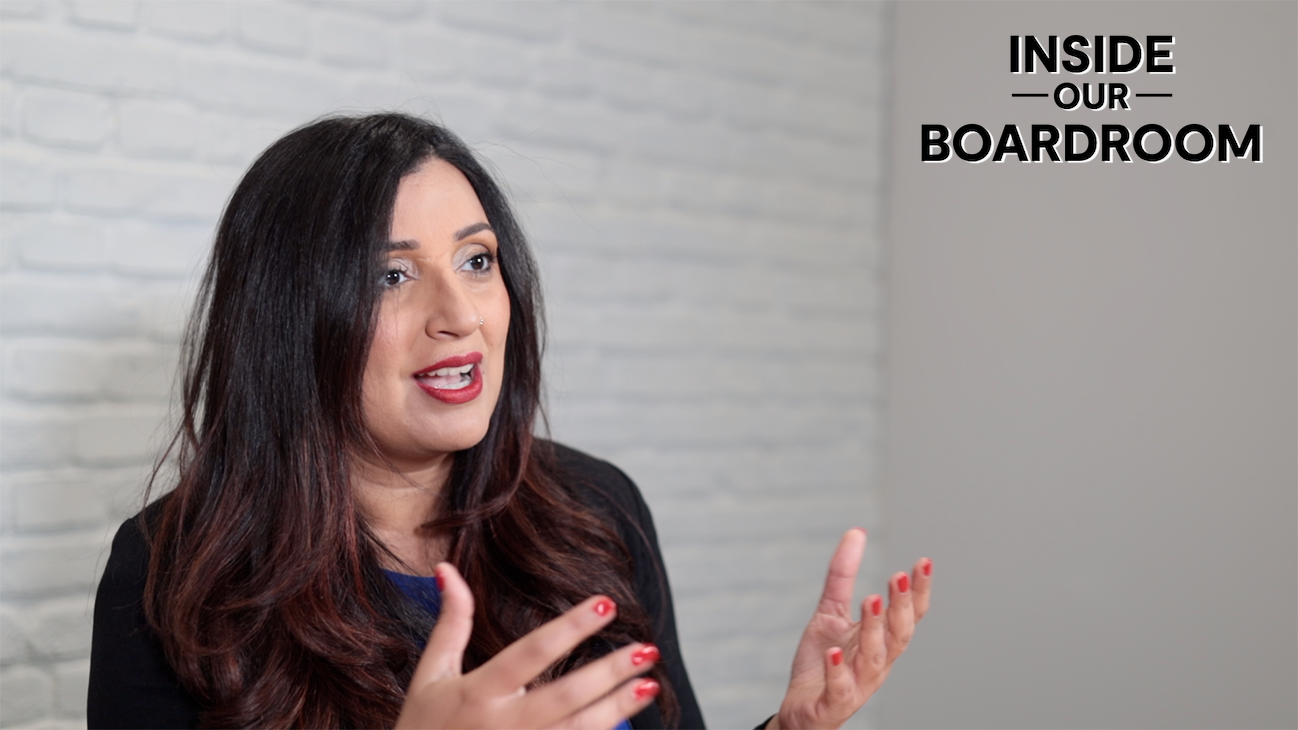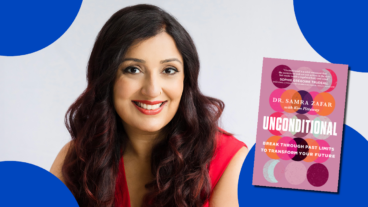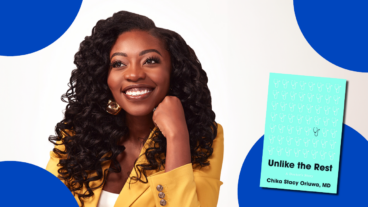Dr. Samra Zafar is passionate about helping people live and lead with courage to become agents for change. As an award-winning speaker, bestselling author, and resident psychiatrist, she specializes in authentic leadership, belonging, and inclusive wellness — providing science-backed tools that help leaders build workplace cultures where teams can thrive.
Samra recently joined us “Inside Our Boardroom” where she explored the power of inclusive wellness and authentic leadership in an AI-driven world, and why courage — not fearlessness — is the key to personal and organizational transformation in uncertain times.
Answers have been edited for length and clarity.
From Adversity to Purpose
SpSp: Can you share a pivotal moment from your life that shaped your journey towards helping people unlock their true potential?
Dr. Samra Zafar: There have been a number of pivotal moments in my life that have shaped who I am and my purpose — to help people see the light they have within.
There is one moment that I will never forget — that changed the trajectory of my life forever. I had come to Canada as a child bride in a forced marriage with no autonomy, agency, or freedom. The only place I was allowed to go in those early years of my marriage was the nearby early childhood drop-in centre.
One day as I was coming back from the centre, my daughter asked for a donut. I went to Tim Hortons, I ordered the donut, and I put my hand in my pocket to get the toonie that I found lying around in the house the night before, and I couldn’t find it. I was mortified. And then I heard a voice behind me, “Ma’am, can I buy you a cup of coffee? Can I buy your daughter a donut?” A man, who was a complete stranger, looked at me with the kindest eye and insisted on paying.
In that moment I felt so pathetic, so powerless. However, that man’s kindness shown through like a ray of hope. That moment inspired me to take action. That night I went home and ordered my very first course through the independent learning center.
Another pivotal moment was when I started sharing my story. It was after I had left my marriage, which was a very long journey, and I learned my story was not just my story. It’s the story of millions of people around the world. I wanted to do my part to make a difference. So, I started to share my story with the hope that it may help someone. The very first time that my story got published, I logged into my social media, and it was flooded with messages from all over the world, thanking me.
That was certainly one of the days when I found my why and I vowed to myself that this is just the beginning.
Samra shares more of her inspiring journey in the video below:
Personal Transformation: From Limited to Unconditional
SpSp: How did the writing process differ from your first book, A Good Wife, to your second book, Unconditional: Break Through Past Limits to Transform Your Future?
SZ: When I wrote my first book, A Good Wife, I was escaping the life I never chose. That book is a pure memoir. It’s my story. The story of being forced into marriage as a child and going through a decade of abuse before leaving and building a new life for myself and my daughters.
It was a very, very vulnerable experience to write it. There were many moments where I questioned, should I share this or not? I got through those moments by recognizing what I would have wanted to read when I was going through it.
I didn’t want to read about somebody without vulnerabilities or who made no mistakes. What I would have wanted to read is about somebody who struggles, like I was struggling. Somebody who had missteps and setbacks along their journey. So, I wanted to be intensely vulnerable, which was hard. There were moments where I had to take care of myself.
The way that my second book, Unconditional, came about is that when I left my marriage, I thought my biggest challenge would be to learn new skills. I didn’t know what networking was. I did not know how to find a job. I didn’t have the people skills that others took for granted.
However, I learned those skills pretty quickly. The bigger challenge was the internal unlearning that I had to do. It was less about learning new skills and more about unlearning the narratives that I grew up with that had formed the blueprint of my life. Unlearning the limiting beliefs that held me back.
I wanted to share that with the world in a way that combines lived experience with tools and strategies and scientific “aha” moments that readers can implement in their own lives right away. So, they can all unlock their own potential and unleash their own unstoppable power.
Belonging in the Workplace
SpSp: What is inclusive wellness and how does it help foster belonging?
SZ: Our understanding of wellness and the way we think about wellness in mainstream corporate culture is that you work hard, and you play hard. We work ourselves to the ground, we burn out, we go take a spa day, and we think that’s going to fix everything. But it doesn’t, and it catches up to us.
True wellness lies in authentic belonging. It lies in feeling of yes, I am accepted in my wholeness.
We are hardwired for connection as human beings. It’s part of our neurobiology. So, when we feel connected to each other, it automatically activates the reward system in our brains. It motivates us, it helps us feel good about ourselves, and it inspires us to take action in the directions we want to go. So, our resilience and wellness are dependent in many ways on our sense of belonging and connection.
So, how do you create belonging? Belonging is an overlap of two things. One is how am I feeling on the inside — have I worked through my own limiting beliefs? Am I showing up as authentic as I possibly can?
And then it’s the outer work — has the organization done their work or are they doing their work to create inclusive spaces, to address unconscious biases, to train their leaders to be more inclusive and more vulnerable? Do they welcome authenticity?
If we go into places that are not welcoming to authenticity, we’re not going to feel like we belong. Similarly, if we are not feeling safe to be authentic — if we’re held back by limiting beliefs — we’re not going to feel like we belong.
That is the essence of inclusive wellness. It’s about creating cultures, workplaces, and environments where people feel safe to be who they are.
Learn more about inclusive wellness and how we all have the ability to foster cultures of belonging in the video below:
Leadership in the Age of AI
SpSp: How does an organization balance emotional intelligence with AI?
SZ: AI is here to stay. It’s going to integrate into every aspect of our lives. We know that, and that gives rise to a ton of uncertainty. Is my job going to become obsolete? What’s going to help me shine as a leader?
20 years ago, people were promoted for their ability to crunch numbers on a spreadsheet. Today, that work is going to be done for them. So, what’s going to set me apart? What’s going to help me shine? What’s going to make me more effective? Being more human. We need to double down on what makes us human.
What is it that AI can never replace? It’s the ability to feel. A machine can interpret emotions, it can predict to some extent, it can mimic, but it cannot feel emotions.
Empathy and the essence of humanity is the ability to feel with each other. It’s the ability to make each other feel that we’re not alone. It’s the ability to be able to understand. So, it’s really important to develop our humanity and our understanding and awareness of feelings and emotions. In other words, to be more emotionally intelligent, more emotionally aware, so that we can connect with each other in a more authentic way that a machine can never replicate.
That is what my work is centered on right now — how do we double down on being human, while also leveraging the advantages AI gives us. For example, AI might be able to give you signs or predictions that an employee’s tone of voice or their body movements are indicative of early signs of burnout. That gives you an opener for a conversation as a leader. It doesn’t replace the conversation, but it gives you data that you can use to your advantage to make your employees feel safer, to make them feel more engaged, and to create a workplace culture that fosters belonging and authenticity.
Samra explores this in more depth in her keynote, “The Science of Authentic Leadership: How to Lead with Emotional Intelligence while Embracing Artificial Intelligence”. Learn more in the keynote below:
Courage vs. Fearlessness
SpSp: Is there a secret to tackling life’s journey?
SZ: If there is one word that I can hang my hat on at the end of my life, and that professionally and personally has been the biggest ingredient, the biggest essence of my work, it’s courage.
When you go into bookstores, you’ll see a lot of books and journals that have the word “fearless” written on them. Be fearless, be bold. But fearlessness is a myth. There is no such thing as fearless. We are all afraid. Fear is a very natural part of our human emotion spectrum. It’s something that keeps us safe. However, it can also keep us from doing things that are good for ourselves and others, because fear comes from a place of uncertainty, the unknown.
Courage is not the absence of fear. It’s not about fighting fear, but accepting it — yes, I’m afraid, but I believe in something. I believe in this dream, I believe in this vision of a better me, a more resilient me, a better workplace culture, my new business, a better world, etc., and I’m going to take the step that moves me closer to that vision alongside fear.
That is the essence of the work that I do. Helping people, workplaces, leaders take courageous steps that leads to bold results.
Samra explores the power of courage in her keynote, “The Power of Incremental Courage: How to Live and Lead with Boldness”. Watch the video below to learn more:
Book Dr. Samra Zafar for Your Next Event
Ready to inspire your team? Dr. Samra Zafar‘s compelling keynotes combine scientific research with lived experience to deliver actionable strategies your organization can implement immediately.
Contact us today to book Samra for your next event and discover how her unique perspective can help your team navigate change, foster belonging, and achieve bold results in today’s complex workplace.




